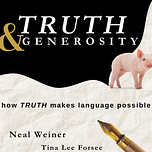“Cultural differences come to light only against a background of transcultural understanding.”
News, updates, etc.:
Free PDF download of Neal’s Ph.D. thesis on Plato.
Free ebook of my senior thesis: Reconciling Science and Religion, a comparison of ancient and modern worldviews through Plato & Descartes.
You can customize which bits of the newsletter you receive by visiting your account at any time. My regular posts will continue to be free.
We appreciate your support! Thank you!
—Neal and Tina
10
Radical Interpretation
THE WAY WE RELATE to foreign languages is not fundamentally different from the way we relate to equivocation, dialect, idiolect, and metaphor in our own. The language we seek to translate is going to be as richly equivocal for its own native speakers as ours is for us, and since they use the principle of generosity in interpreting their own language, we will have to do the same and do it at least as much as they do. Since this point is fundamental, it deserves some exposition.
This thought experiment, originally called radical translation, was first developed by Quine then later generalized under the label radical interpretation by Davidson, who used it to shed light on the basic conditions for the possibility of translation. We are to imagine an anthropologist—let’s call him Donald—among an utterly unknown people—say, the Pepsis—whose language has no connection to any known speech. The purpose of the anthropologist’s research is to write the first Pepsi-English dictionary. Our purpose is to find out whether Donald must share with the Pepsis a certain body of belief in order to do so.
We imagine Donald in an open field with a native. As a rabbit runs by, the native Pepsi lifts his foot in its direction and utters the sound GAVAGI (Quine’s ‘word’) in a certain tone of voice. He then runs away at a moderate but quick speed, with a brisk, light-footed gait, and a hopeful, curious demeanor. What is Donald to make of this far-from-decisive beginning? Does GAVAGI mean rabbit or does it mean mammal, hopping creature, furry creature, or cute little thing? It could also refer to the grass, the trees beyond, or perhaps the flower that was near the rabbit at the moment of speech. And what about the gesture? It does not have to be equivalent to our pointing. It could mean I want to kick that thing. Or, Run for it! Or, I want to urinate. Or, Here comes dinner! And so on. Possibly GAVAGI is not a word at all, but merely a grunt that Pepsis make before running, similar to the grunt of weight lifters during their exertions.
Listen to this episode with a 7-day free trial
Subscribe to Philosophy and Fiction to listen to this post and get 7 days of free access to the full post archives.









